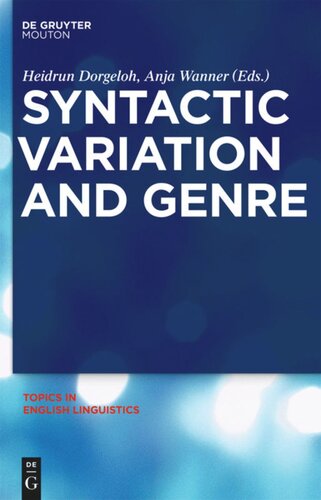

Most ebook files are in PDF format, so you can easily read them using various software such as Foxit Reader or directly on the Google Chrome browser.
Some ebook files are released by publishers in other formats such as .awz, .mobi, .epub, .fb2, etc. You may need to install specific software to read these formats on mobile/PC, such as Calibre.
Please read the tutorial at this link: https://ebookbell.com/faq
We offer FREE conversion to the popular formats you request; however, this may take some time. Therefore, right after payment, please email us, and we will try to provide the service as quickly as possible.
For some exceptional file formats or broken links (if any), please refrain from opening any disputes. Instead, email us first, and we will try to assist within a maximum of 6 hours.
EbookBell Team

4.7
46 reviewsThis volume explores the interplay of syntactic variation and genre. How do genres emerge and what is the role of syntax in constituting them? Why do certain constructions appear in certain types of text? The book takes the concept of genre as a reference-point for the description and analysis of morpho-syntactic variation and change. It includes both overviews of theoretical approaches to the concept of genre and text type in linguistics and studies of specific syntactic phenomena in English, German, and selected Romance languages.
Contributions to the volume make use of insights from attempts for text classification and rhetorical views on genre and reach from quantitative, corpus-based methodology to qualitative, text-based analyses. The types of texts investigated cover spoken, highly interactive, and written forms of communication, including selected genres of computer-mediated communication. Corpus data come from both synchronic and diachronic linguistic corpora, such as LOB, Brown, FLOB, Frown, ARCHER, and ICE-Jamaica. This spectrum both in approaches and data is meant to provide a theoretical foundation as well as a realistic view of the inherent complexity of form-function relationships in syntax. At the same time, genre is treated as a category relevant beyond discourse studies, consisting of forms and conventions at all levels of linguistic analysis, including syntax.
The book is therefore of interest to linguists and graduate students in the area of syntax, discourse analysis, and pragmatics, as well as to sociolinguists and corpus linguists working on register variation.